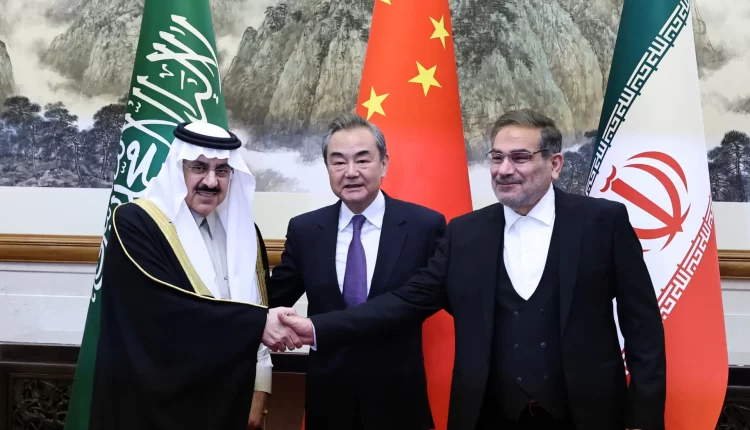
QAMISHLI, Syria (North Press) – In a surprise move, the Iranian and Saudi Arabian governments mended ties in Beijing this week. How will this new dynamic play out for Syria?
Following the agreement, brokered by the Chinese government, the two countries have two weeks to reopen embassies in each other’s capitals. The rapprochement is likely to involve an understanding on Yemen, too, where both countries have bankrolled opposing sides for a decade. Saudi Arabia will likely abandon its support for the Yemeni government in return for Iran reining in its Houthi partners.
For Saudi Arabia, the agreement is a natural step in weaning itself off of regional conflicts. It made peace with Qatar and Turkey recently. Closer ties with Israel and Syria are on the horizon, too. Iran, sanctioned and ravaged by popular protests, is given an opening, however small, to re-join the global economy after years of sanctions by the West and its partners. Both countries are also seeking closer relations with China.
How may the new arrangement impact Syria? The government in Damascus has been one of Iran’s closest partners. It likely would not have survived a 12-year-long civil war without its help. On the other hand, millions of dollars in financing poured from Saudi Arabia to Syrian Islamist groups in opposition to the government throughout the first years of the crisis. In recent years, however, Saudi Arabia has become more aloof.
The Syrian government is keen on mending ties, too. Some countries, such as Jordan, Egypt and the UAE, have heeded the call, despite warnings from the US. High-level talks were also held between Syria and Turkey, which still occupies around most of its northern border regions.
Saudi Arabia has given the first signs of warming ties, saying last week that al-Assad’s Syria should be welcomed back into the Arab League, though it was yet “too early for that.” In turn, the Syrian Foreign Minister Faisal al-Mekdad called the Iran-Saudi agreement an “important step that will lead to strengthening security and stability in the region.”
A happy ending for all? Not quite. Though the deal will lead to more stability in the Middle East, it has left one government in particular alienated: Israel. Israel, too, has attempted to forge closer ties to its neighbours, notably through the US-sponsored ‘Abraham Accords’. A few Gulf partners were already onboard; Saudi Arabia was the next target. Luring countries with business opportunities, Israel wanted to cement their relationship with a counter-Iran axis. This is now unlikely. Yair Lapid, a former Israeli prime minister said the Riyadh-Tehran agreement was “a full and dangerous failure of the Israeli government’s foreign policy.”
Israel has ramped up attacks against Iranian targets, including in Syria. Its airstrikes have hit critical infrastructure, including the Aleppo and Damascus airports, the country’s two main gates to the outside, putting them out of commission for several days.
Should the rapprochement between Saudi Arabia and Iran continue on this path, the government in Riyadh will likely resume its investment into Syria in the not-too-distant future. Ongoing attacks by Israel against airports and other vital infrastructure, critical to Saudi’s business interests, will put the Gulf country on a direct collision course with the Jewish state.
On the other hand, the Syrian government is likely to be one of the major winners of the new regional peace – should it hold. Besides being welcomed back in the Middle East’s capitals after a decade-long pariah status, and not have to choose between investment from Iran and the Gulf, Syria is also likely to benefit from Beijing’s growing interest in the region, exemplified by their involvement in the recent agreement.
